Organisational Behaviour and Motivation Theories for Effective Team Development: A Case Study of Marks and Spencer
VerifiedAdded on 2023/06/18
|12
|3691
|142
AI Summary
This report discusses the impact of organisational behaviour, power, politics, and motivation theories on team development and performance. It includes a case study of Marks and Spencer and provides insights into creating an effective team. The report covers Maslow's need hierarchy theory, reinforcement theory, and Tuckman's theory of team development.
Contribute Materials
Your contribution can guide someone’s learning journey. Share your
documents today.
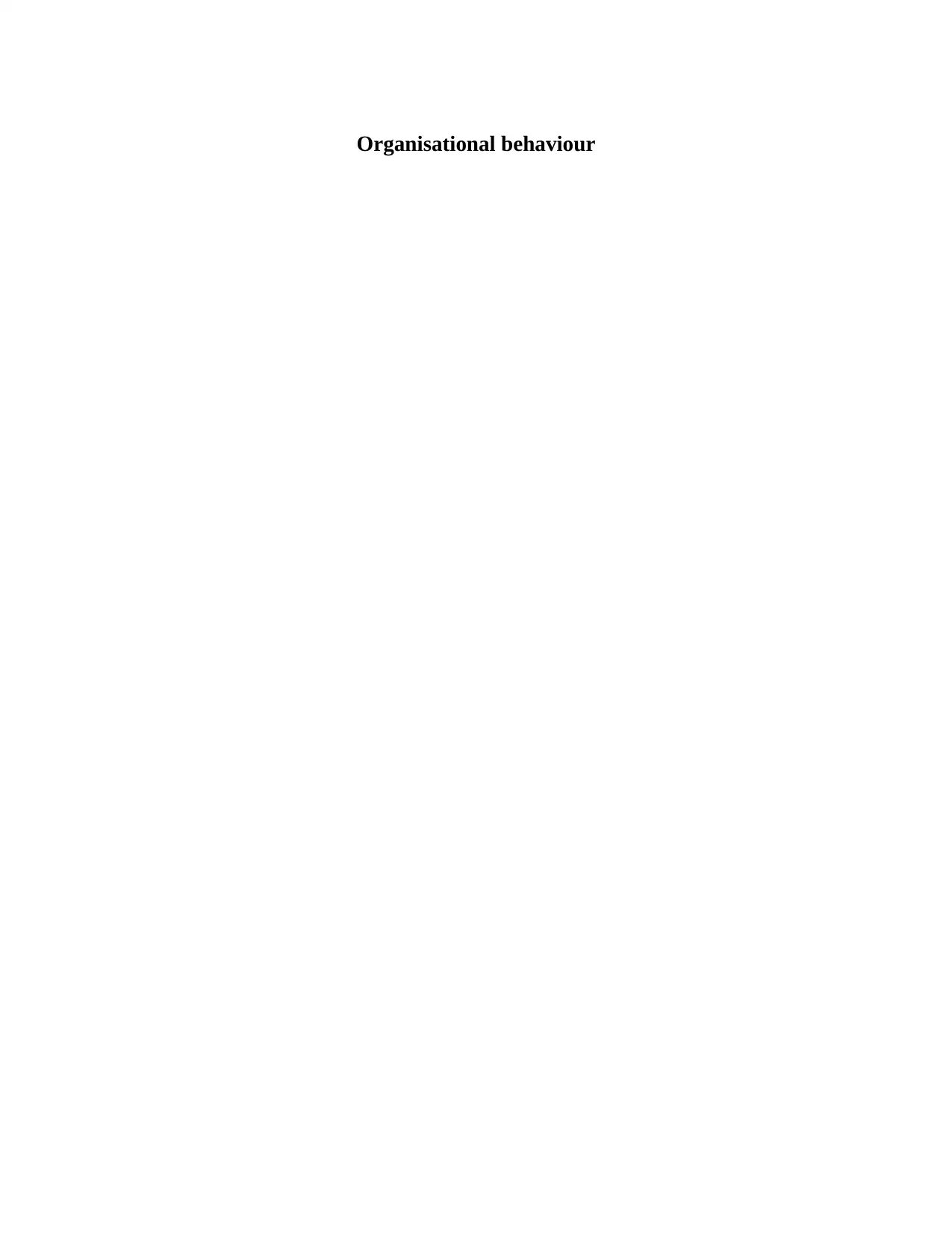
Organisational behaviour
Secure Best Marks with AI Grader
Need help grading? Try our AI Grader for instant feedback on your assignments.
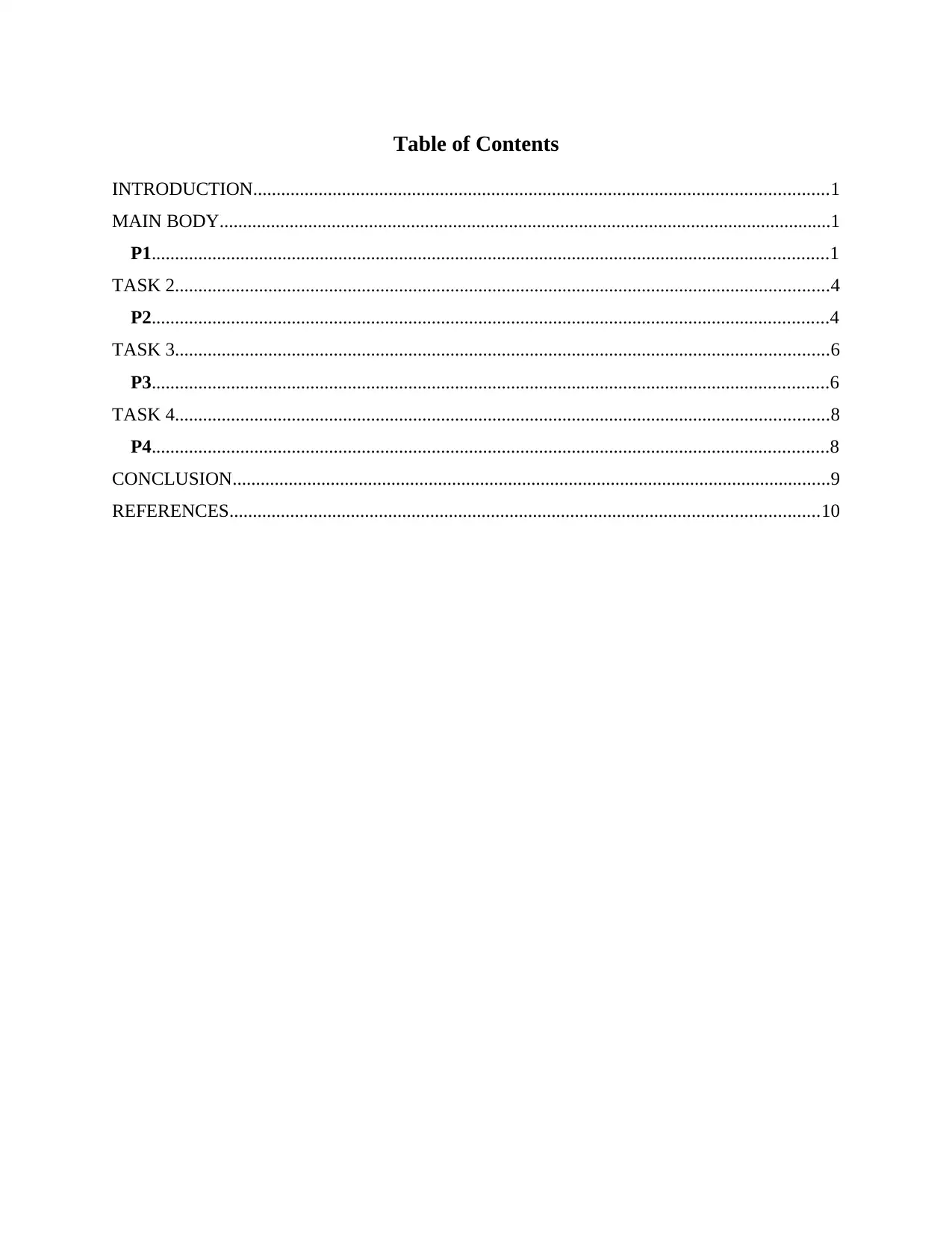
Table of Contents
INTRODUCTION...........................................................................................................................1
MAIN BODY...................................................................................................................................1
P1.................................................................................................................................................1
TASK 2............................................................................................................................................4
P2.................................................................................................................................................4
TASK 3............................................................................................................................................6
P3.................................................................................................................................................6
TASK 4............................................................................................................................................8
P4.................................................................................................................................................8
CONCLUSION................................................................................................................................9
REFERENCES..............................................................................................................................10
INTRODUCTION...........................................................................................................................1
MAIN BODY...................................................................................................................................1
P1.................................................................................................................................................1
TASK 2............................................................................................................................................4
P2.................................................................................................................................................4
TASK 3............................................................................................................................................6
P3.................................................................................................................................................6
TASK 4............................................................................................................................................8
P4.................................................................................................................................................8
CONCLUSION................................................................................................................................9
REFERENCES..............................................................................................................................10
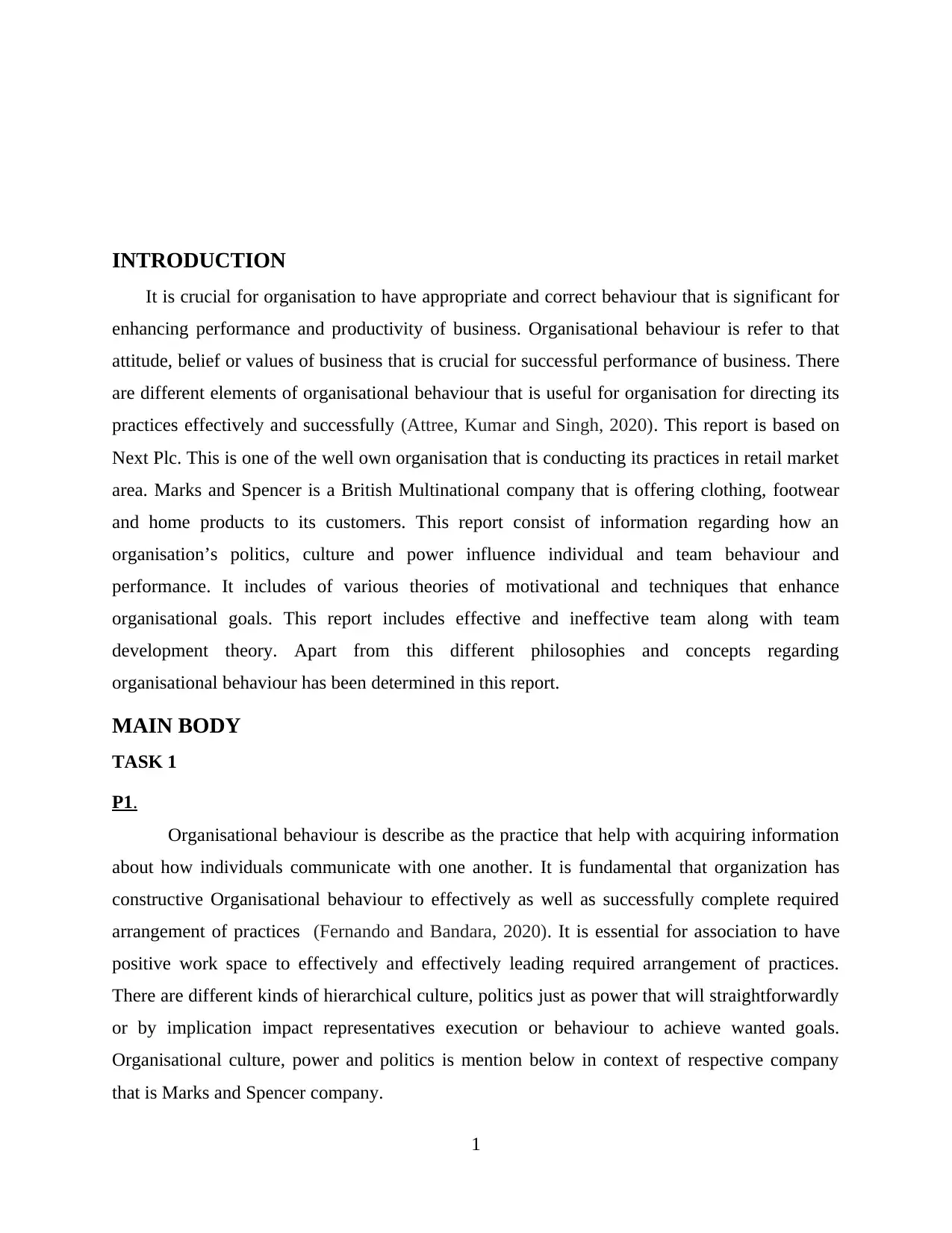
INTRODUCTION
It is crucial for organisation to have appropriate and correct behaviour that is significant for
enhancing performance and productivity of business. Organisational behaviour is refer to that
attitude, belief or values of business that is crucial for successful performance of business. There
are different elements of organisational behaviour that is useful for organisation for directing its
practices effectively and successfully (Attree, Kumar and Singh, 2020). This report is based on
Next Plc. This is one of the well own organisation that is conducting its practices in retail market
area. Marks and Spencer is a British Multinational company that is offering clothing, footwear
and home products to its customers. This report consist of information regarding how an
organisation’s politics, culture and power influence individual and team behaviour and
performance. It includes of various theories of motivational and techniques that enhance
organisational goals. This report includes effective and ineffective team along with team
development theory. Apart from this different philosophies and concepts regarding
organisational behaviour has been determined in this report.
MAIN BODY
TASK 1
P1.
Organisational behaviour is describe as the practice that help with acquiring information
about how individuals communicate with one another. It is fundamental that organization has
constructive Organisational behaviour to effectively as well as successfully complete required
arrangement of practices (Fernando and Bandara, 2020). It is essential for association to have
positive work space to effectively and effectively leading required arrangement of practices.
There are different kinds of hierarchical culture, politics just as power that will straightforwardly
or by implication impact representatives execution or behaviour to achieve wanted goals.
Organisational culture, power and politics is mention below in context of respective company
that is Marks and Spencer company.
1
It is crucial for organisation to have appropriate and correct behaviour that is significant for
enhancing performance and productivity of business. Organisational behaviour is refer to that
attitude, belief or values of business that is crucial for successful performance of business. There
are different elements of organisational behaviour that is useful for organisation for directing its
practices effectively and successfully (Attree, Kumar and Singh, 2020). This report is based on
Next Plc. This is one of the well own organisation that is conducting its practices in retail market
area. Marks and Spencer is a British Multinational company that is offering clothing, footwear
and home products to its customers. This report consist of information regarding how an
organisation’s politics, culture and power influence individual and team behaviour and
performance. It includes of various theories of motivational and techniques that enhance
organisational goals. This report includes effective and ineffective team along with team
development theory. Apart from this different philosophies and concepts regarding
organisational behaviour has been determined in this report.
MAIN BODY
TASK 1
P1.
Organisational behaviour is describe as the practice that help with acquiring information
about how individuals communicate with one another. It is fundamental that organization has
constructive Organisational behaviour to effectively as well as successfully complete required
arrangement of practices (Fernando and Bandara, 2020). It is essential for association to have
positive work space to effectively and effectively leading required arrangement of practices.
There are different kinds of hierarchical culture, politics just as power that will straightforwardly
or by implication impact representatives execution or behaviour to achieve wanted goals.
Organisational culture, power and politics is mention below in context of respective company
that is Marks and Spencer company.
1
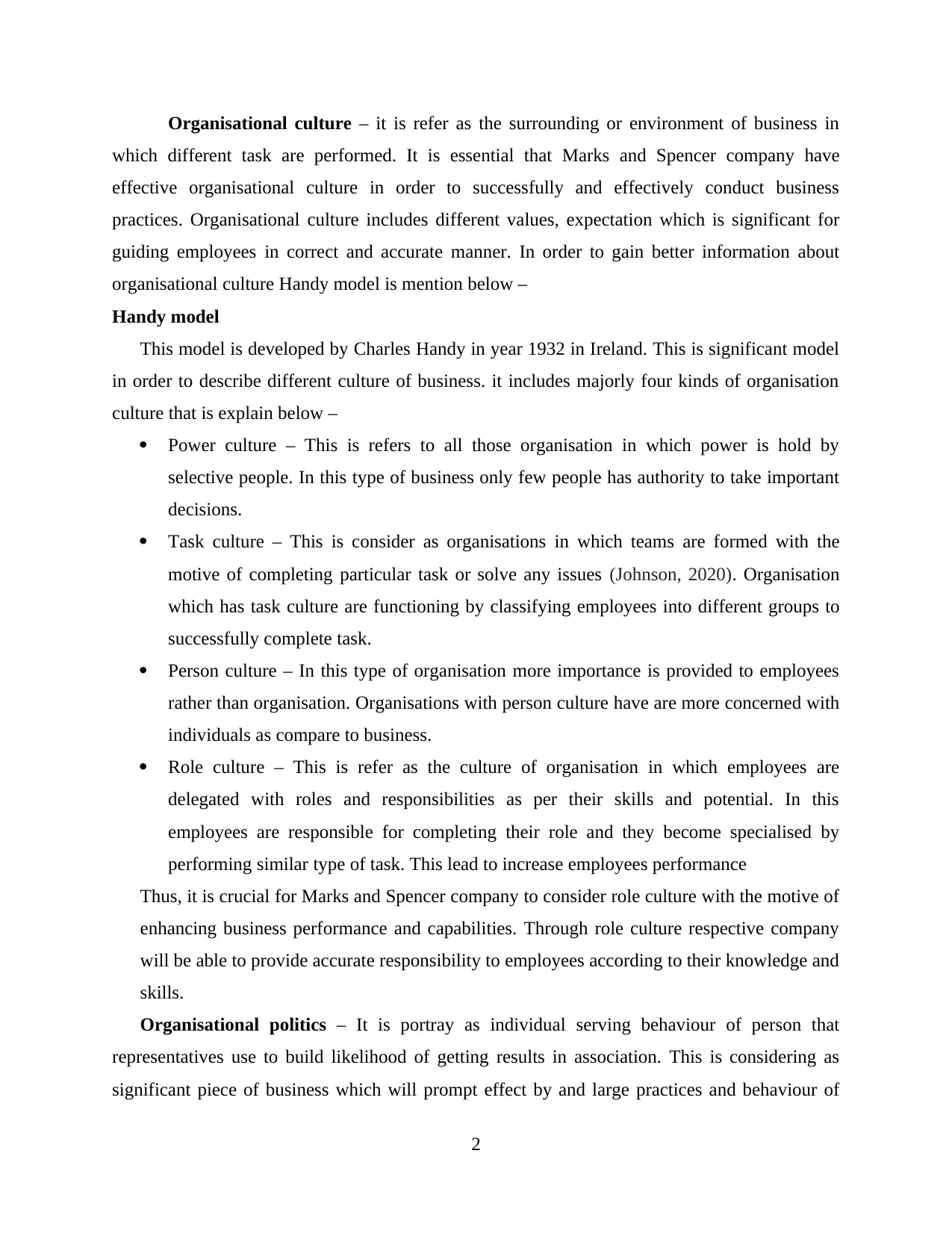
Organisational culture – it is refer as the surrounding or environment of business in
which different task are performed. It is essential that Marks and Spencer company have
effective organisational culture in order to successfully and effectively conduct business
practices. Organisational culture includes different values, expectation which is significant for
guiding employees in correct and accurate manner. In order to gain better information about
organisational culture Handy model is mention below –
Handy model
This model is developed by Charles Handy in year 1932 in Ireland. This is significant model
in order to describe different culture of business. it includes majorly four kinds of organisation
culture that is explain below –
Power culture – This is refers to all those organisation in which power is hold by
selective people. In this type of business only few people has authority to take important
decisions.
Task culture – This is consider as organisations in which teams are formed with the
motive of completing particular task or solve any issues (Johnson, 2020). Organisation
which has task culture are functioning by classifying employees into different groups to
successfully complete task.
Person culture – In this type of organisation more importance is provided to employees
rather than organisation. Organisations with person culture have are more concerned with
individuals as compare to business.
Role culture – This is refer as the culture of organisation in which employees are
delegated with roles and responsibilities as per their skills and potential. In this
employees are responsible for completing their role and they become specialised by
performing similar type of task. This lead to increase employees performance
Thus, it is crucial for Marks and Spencer company to consider role culture with the motive of
enhancing business performance and capabilities. Through role culture respective company
will be able to provide accurate responsibility to employees according to their knowledge and
skills.
Organisational politics – It is portray as individual serving behaviour of person that
representatives use to build likelihood of getting results in association. This is considering as
significant piece of business which will prompt effect by and large practices and behaviour of
2
which different task are performed. It is essential that Marks and Spencer company have
effective organisational culture in order to successfully and effectively conduct business
practices. Organisational culture includes different values, expectation which is significant for
guiding employees in correct and accurate manner. In order to gain better information about
organisational culture Handy model is mention below –
Handy model
This model is developed by Charles Handy in year 1932 in Ireland. This is significant model
in order to describe different culture of business. it includes majorly four kinds of organisation
culture that is explain below –
Power culture – This is refers to all those organisation in which power is hold by
selective people. In this type of business only few people has authority to take important
decisions.
Task culture – This is consider as organisations in which teams are formed with the
motive of completing particular task or solve any issues (Johnson, 2020). Organisation
which has task culture are functioning by classifying employees into different groups to
successfully complete task.
Person culture – In this type of organisation more importance is provided to employees
rather than organisation. Organisations with person culture have are more concerned with
individuals as compare to business.
Role culture – This is refer as the culture of organisation in which employees are
delegated with roles and responsibilities as per their skills and potential. In this
employees are responsible for completing their role and they become specialised by
performing similar type of task. This lead to increase employees performance
Thus, it is crucial for Marks and Spencer company to consider role culture with the motive of
enhancing business performance and capabilities. Through role culture respective company
will be able to provide accurate responsibility to employees according to their knowledge and
skills.
Organisational politics – It is portray as individual serving behaviour of person that
representatives use to build likelihood of getting results in association. This is considering as
significant piece of business which will prompt effect by and large practices and behaviour of
2
Secure Best Marks with AI Grader
Need help grading? Try our AI Grader for instant feedback on your assignments.
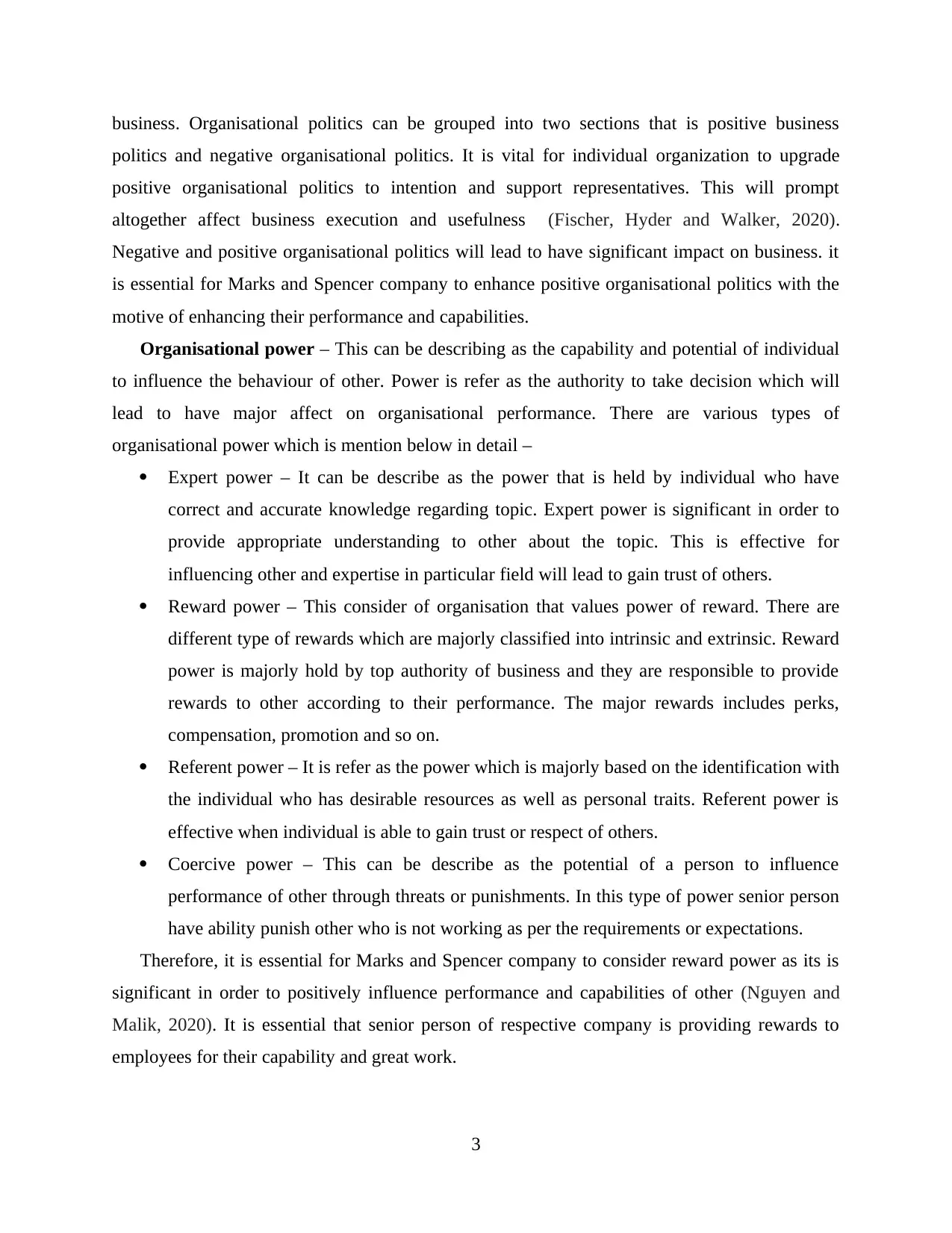
business. Organisational politics can be grouped into two sections that is positive business
politics and negative organisational politics. It is vital for individual organization to upgrade
positive organisational politics to intention and support representatives. This will prompt
altogether affect business execution and usefulness (Fischer, Hyder and Walker, 2020).
Negative and positive organisational politics will lead to have significant impact on business. it
is essential for Marks and Spencer company to enhance positive organisational politics with the
motive of enhancing their performance and capabilities.
Organisational power – This can be describing as the capability and potential of individual
to influence the behaviour of other. Power is refer as the authority to take decision which will
lead to have major affect on organisational performance. There are various types of
organisational power which is mention below in detail –
Expert power – It can be describe as the power that is held by individual who have
correct and accurate knowledge regarding topic. Expert power is significant in order to
provide appropriate understanding to other about the topic. This is effective for
influencing other and expertise in particular field will lead to gain trust of others.
Reward power – This consider of organisation that values power of reward. There are
different type of rewards which are majorly classified into intrinsic and extrinsic. Reward
power is majorly hold by top authority of business and they are responsible to provide
rewards to other according to their performance. The major rewards includes perks,
compensation, promotion and so on.
Referent power – It is refer as the power which is majorly based on the identification with
the individual who has desirable resources as well as personal traits. Referent power is
effective when individual is able to gain trust or respect of others.
Coercive power – This can be describe as the potential of a person to influence
performance of other through threats or punishments. In this type of power senior person
have ability punish other who is not working as per the requirements or expectations.
Therefore, it is essential for Marks and Spencer company to consider reward power as its is
significant in order to positively influence performance and capabilities of other (Nguyen and
Malik, 2020). It is essential that senior person of respective company is providing rewards to
employees for their capability and great work.
3
politics and negative organisational politics. It is vital for individual organization to upgrade
positive organisational politics to intention and support representatives. This will prompt
altogether affect business execution and usefulness (Fischer, Hyder and Walker, 2020).
Negative and positive organisational politics will lead to have significant impact on business. it
is essential for Marks and Spencer company to enhance positive organisational politics with the
motive of enhancing their performance and capabilities.
Organisational power – This can be describing as the capability and potential of individual
to influence the behaviour of other. Power is refer as the authority to take decision which will
lead to have major affect on organisational performance. There are various types of
organisational power which is mention below in detail –
Expert power – It can be describe as the power that is held by individual who have
correct and accurate knowledge regarding topic. Expert power is significant in order to
provide appropriate understanding to other about the topic. This is effective for
influencing other and expertise in particular field will lead to gain trust of others.
Reward power – This consider of organisation that values power of reward. There are
different type of rewards which are majorly classified into intrinsic and extrinsic. Reward
power is majorly hold by top authority of business and they are responsible to provide
rewards to other according to their performance. The major rewards includes perks,
compensation, promotion and so on.
Referent power – It is refer as the power which is majorly based on the identification with
the individual who has desirable resources as well as personal traits. Referent power is
effective when individual is able to gain trust or respect of others.
Coercive power – This can be describe as the potential of a person to influence
performance of other through threats or punishments. In this type of power senior person
have ability punish other who is not working as per the requirements or expectations.
Therefore, it is essential for Marks and Spencer company to consider reward power as its is
significant in order to positively influence performance and capabilities of other (Nguyen and
Malik, 2020). It is essential that senior person of respective company is providing rewards to
employees for their capability and great work.
3
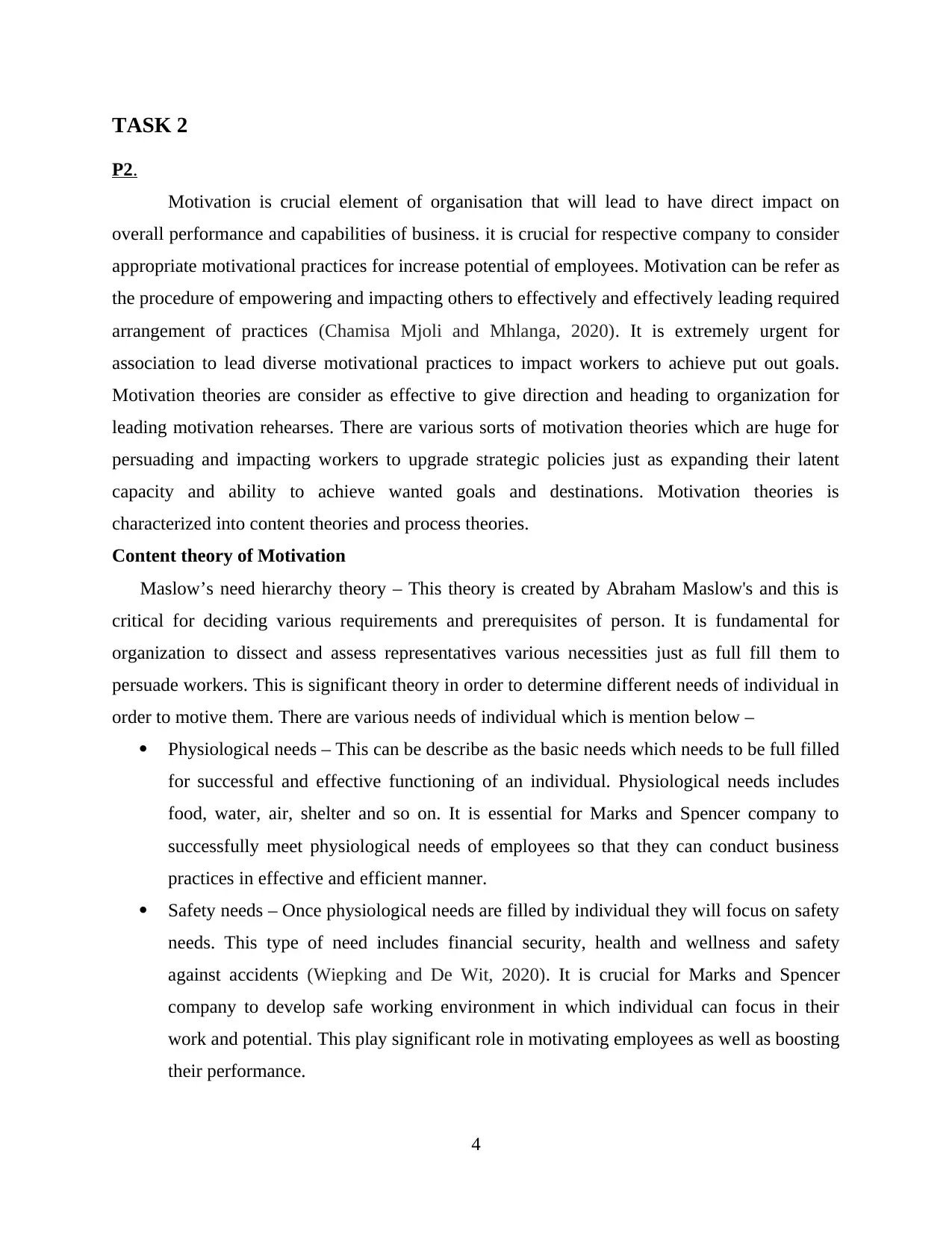
TASK 2
P2.
Motivation is crucial element of organisation that will lead to have direct impact on
overall performance and capabilities of business. it is crucial for respective company to consider
appropriate motivational practices for increase potential of employees. Motivation can be refer as
the procedure of empowering and impacting others to effectively and effectively leading required
arrangement of practices (Chamisa Mjoli and Mhlanga, 2020). It is extremely urgent for
association to lead diverse motivational practices to impact workers to achieve put out goals.
Motivation theories are consider as effective to give direction and heading to organization for
leading motivation rehearses. There are various sorts of motivation theories which are huge for
persuading and impacting workers to upgrade strategic policies just as expanding their latent
capacity and ability to achieve wanted goals and destinations. Motivation theories is
characterized into content theories and process theories.
Content theory of Motivation
Maslow’s need hierarchy theory – This theory is created by Abraham Maslow's and this is
critical for deciding various requirements and prerequisites of person. It is fundamental for
organization to dissect and assess representatives various necessities just as full fill them to
persuade workers. This is significant theory in order to determine different needs of individual in
order to motive them. There are various needs of individual which is mention below –
Physiological needs – This can be describe as the basic needs which needs to be full filled
for successful and effective functioning of an individual. Physiological needs includes
food, water, air, shelter and so on. It is essential for Marks and Spencer company to
successfully meet physiological needs of employees so that they can conduct business
practices in effective and efficient manner.
Safety needs – Once physiological needs are filled by individual they will focus on safety
needs. This type of need includes financial security, health and wellness and safety
against accidents (Wiepking and De Wit, 2020). It is crucial for Marks and Spencer
company to develop safe working environment in which individual can focus in their
work and potential. This play significant role in motivating employees as well as boosting
their performance.
4
P2.
Motivation is crucial element of organisation that will lead to have direct impact on
overall performance and capabilities of business. it is crucial for respective company to consider
appropriate motivational practices for increase potential of employees. Motivation can be refer as
the procedure of empowering and impacting others to effectively and effectively leading required
arrangement of practices (Chamisa Mjoli and Mhlanga, 2020). It is extremely urgent for
association to lead diverse motivational practices to impact workers to achieve put out goals.
Motivation theories are consider as effective to give direction and heading to organization for
leading motivation rehearses. There are various sorts of motivation theories which are huge for
persuading and impacting workers to upgrade strategic policies just as expanding their latent
capacity and ability to achieve wanted goals and destinations. Motivation theories is
characterized into content theories and process theories.
Content theory of Motivation
Maslow’s need hierarchy theory – This theory is created by Abraham Maslow's and this is
critical for deciding various requirements and prerequisites of person. It is fundamental for
organization to dissect and assess representatives various necessities just as full fill them to
persuade workers. This is significant theory in order to determine different needs of individual in
order to motive them. There are various needs of individual which is mention below –
Physiological needs – This can be describe as the basic needs which needs to be full filled
for successful and effective functioning of an individual. Physiological needs includes
food, water, air, shelter and so on. It is essential for Marks and Spencer company to
successfully meet physiological needs of employees so that they can conduct business
practices in effective and efficient manner.
Safety needs – Once physiological needs are filled by individual they will focus on safety
needs. This type of need includes financial security, health and wellness and safety
against accidents (Wiepking and De Wit, 2020). It is crucial for Marks and Spencer
company to develop safe working environment in which individual can focus in their
work and potential. This play significant role in motivating employees as well as boosting
their performance.
4
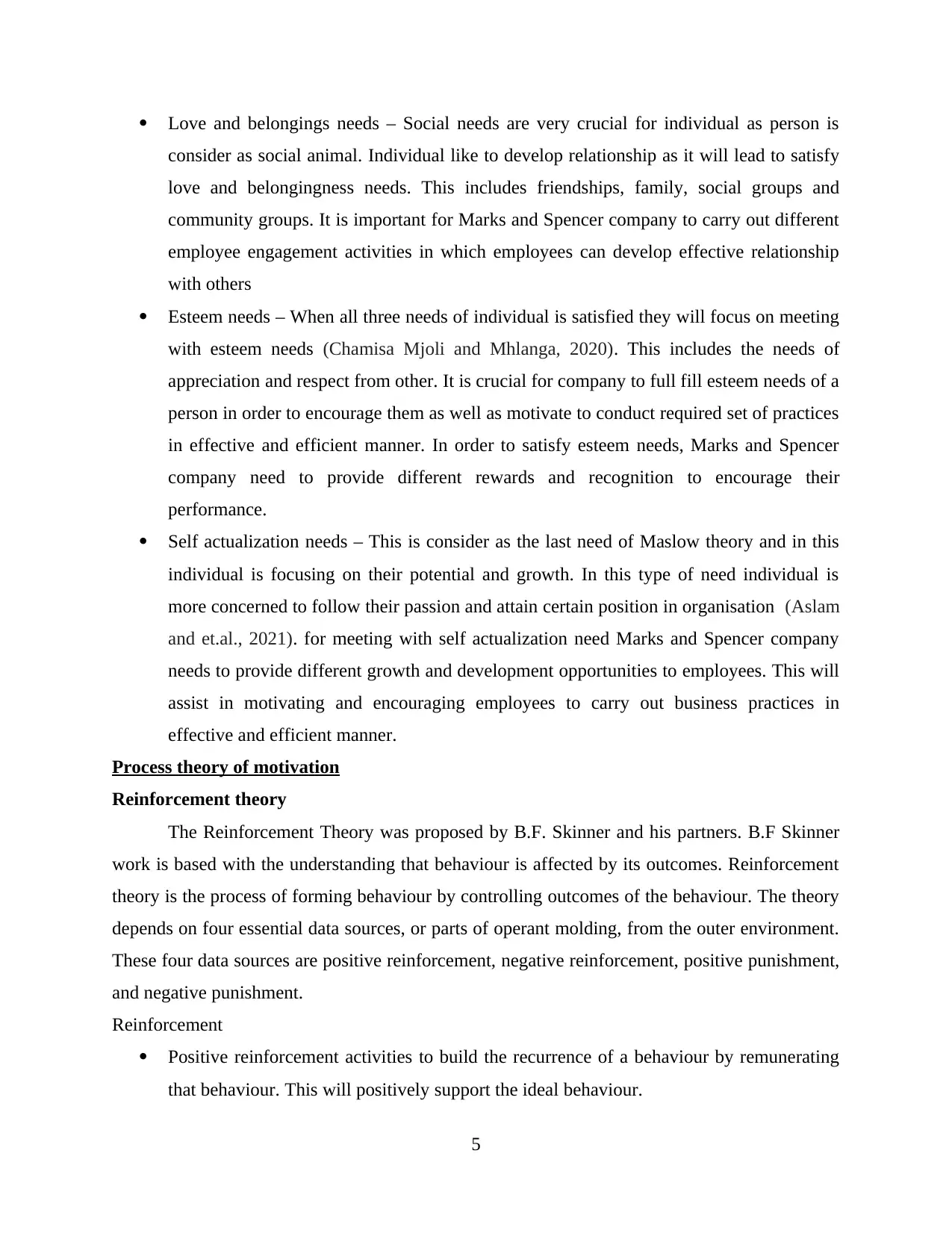
Love and belongings needs – Social needs are very crucial for individual as person is
consider as social animal. Individual like to develop relationship as it will lead to satisfy
love and belongingness needs. This includes friendships, family, social groups and
community groups. It is important for Marks and Spencer company to carry out different
employee engagement activities in which employees can develop effective relationship
with others
Esteem needs – When all three needs of individual is satisfied they will focus on meeting
with esteem needs (Chamisa Mjoli and Mhlanga, 2020). This includes the needs of
appreciation and respect from other. It is crucial for company to full fill esteem needs of a
person in order to encourage them as well as motivate to conduct required set of practices
in effective and efficient manner. In order to satisfy esteem needs, Marks and Spencer
company need to provide different rewards and recognition to encourage their
performance.
Self actualization needs – This is consider as the last need of Maslow theory and in this
individual is focusing on their potential and growth. In this type of need individual is
more concerned to follow their passion and attain certain position in organisation (Aslam
and et.al., 2021). for meeting with self actualization need Marks and Spencer company
needs to provide different growth and development opportunities to employees. This will
assist in motivating and encouraging employees to carry out business practices in
effective and efficient manner.
Process theory of motivation
Reinforcement theory
The Reinforcement Theory was proposed by B.F. Skinner and his partners. B.F Skinner
work is based with the understanding that behaviour is affected by its outcomes. Reinforcement
theory is the process of forming behaviour by controlling outcomes of the behaviour. The theory
depends on four essential data sources, or parts of operant molding, from the outer environment.
These four data sources are positive reinforcement, negative reinforcement, positive punishment,
and negative punishment.
Reinforcement
Positive reinforcement activities to build the recurrence of a behaviour by remunerating
that behaviour. This will positively support the ideal behaviour.
5
consider as social animal. Individual like to develop relationship as it will lead to satisfy
love and belongingness needs. This includes friendships, family, social groups and
community groups. It is important for Marks and Spencer company to carry out different
employee engagement activities in which employees can develop effective relationship
with others
Esteem needs – When all three needs of individual is satisfied they will focus on meeting
with esteem needs (Chamisa Mjoli and Mhlanga, 2020). This includes the needs of
appreciation and respect from other. It is crucial for company to full fill esteem needs of a
person in order to encourage them as well as motivate to conduct required set of practices
in effective and efficient manner. In order to satisfy esteem needs, Marks and Spencer
company need to provide different rewards and recognition to encourage their
performance.
Self actualization needs – This is consider as the last need of Maslow theory and in this
individual is focusing on their potential and growth. In this type of need individual is
more concerned to follow their passion and attain certain position in organisation (Aslam
and et.al., 2021). for meeting with self actualization need Marks and Spencer company
needs to provide different growth and development opportunities to employees. This will
assist in motivating and encouraging employees to carry out business practices in
effective and efficient manner.
Process theory of motivation
Reinforcement theory
The Reinforcement Theory was proposed by B.F. Skinner and his partners. B.F Skinner
work is based with the understanding that behaviour is affected by its outcomes. Reinforcement
theory is the process of forming behaviour by controlling outcomes of the behaviour. The theory
depends on four essential data sources, or parts of operant molding, from the outer environment.
These four data sources are positive reinforcement, negative reinforcement, positive punishment,
and negative punishment.
Reinforcement
Positive reinforcement activities to build the recurrence of a behaviour by remunerating
that behaviour. This will positively support the ideal behaviour.
5
Paraphrase This Document
Need a fresh take? Get an instant paraphrase of this document with our AI Paraphraser
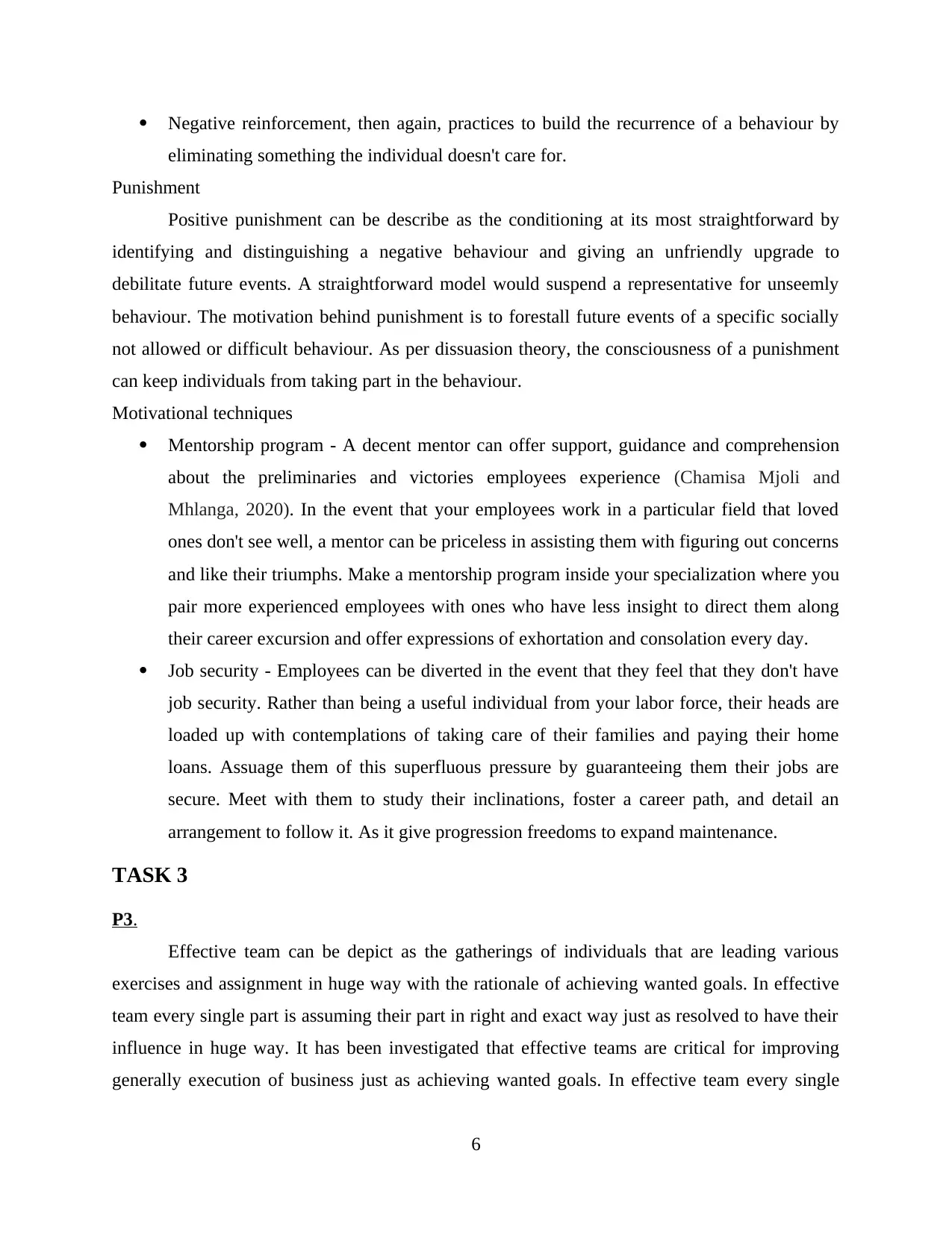
Negative reinforcement, then again, practices to build the recurrence of a behaviour by
eliminating something the individual doesn't care for.
Punishment
Positive punishment can be describe as the conditioning at its most straightforward by
identifying and distinguishing a negative behaviour and giving an unfriendly upgrade to
debilitate future events. A straightforward model would suspend a representative for unseemly
behaviour. The motivation behind punishment is to forestall future events of a specific socially
not allowed or difficult behaviour. As per dissuasion theory, the consciousness of a punishment
can keep individuals from taking part in the behaviour.
Motivational techniques
Mentorship program - A decent mentor can offer support, guidance and comprehension
about the preliminaries and victories employees experience (Chamisa Mjoli and
Mhlanga, 2020). In the event that your employees work in a particular field that loved
ones don't see well, a mentor can be priceless in assisting them with figuring out concerns
and like their triumphs. Make a mentorship program inside your specialization where you
pair more experienced employees with ones who have less insight to direct them along
their career excursion and offer expressions of exhortation and consolation every day.
Job security - Employees can be diverted in the event that they feel that they don't have
job security. Rather than being a useful individual from your labor force, their heads are
loaded up with contemplations of taking care of their families and paying their home
loans. Assuage them of this superfluous pressure by guaranteeing them their jobs are
secure. Meet with them to study their inclinations, foster a career path, and detail an
arrangement to follow it. As it give progression freedoms to expand maintenance.
TASK 3
P3.
Effective team can be depict as the gatherings of individuals that are leading various
exercises and assignment in huge way with the rationale of achieving wanted goals. In effective
team every single part is assuming their part in right and exact way just as resolved to have their
influence in huge way. It has been investigated that effective teams are critical for improving
generally execution of business just as achieving wanted goals. In effective team every single
6
eliminating something the individual doesn't care for.
Punishment
Positive punishment can be describe as the conditioning at its most straightforward by
identifying and distinguishing a negative behaviour and giving an unfriendly upgrade to
debilitate future events. A straightforward model would suspend a representative for unseemly
behaviour. The motivation behind punishment is to forestall future events of a specific socially
not allowed or difficult behaviour. As per dissuasion theory, the consciousness of a punishment
can keep individuals from taking part in the behaviour.
Motivational techniques
Mentorship program - A decent mentor can offer support, guidance and comprehension
about the preliminaries and victories employees experience (Chamisa Mjoli and
Mhlanga, 2020). In the event that your employees work in a particular field that loved
ones don't see well, a mentor can be priceless in assisting them with figuring out concerns
and like their triumphs. Make a mentorship program inside your specialization where you
pair more experienced employees with ones who have less insight to direct them along
their career excursion and offer expressions of exhortation and consolation every day.
Job security - Employees can be diverted in the event that they feel that they don't have
job security. Rather than being a useful individual from your labor force, their heads are
loaded up with contemplations of taking care of their families and paying their home
loans. Assuage them of this superfluous pressure by guaranteeing them their jobs are
secure. Meet with them to study their inclinations, foster a career path, and detail an
arrangement to follow it. As it give progression freedoms to expand maintenance.
TASK 3
P3.
Effective team can be depict as the gatherings of individuals that are leading various
exercises and assignment in huge way with the rationale of achieving wanted goals. In effective
team every single part is assuming their part in right and exact way just as resolved to have their
influence in huge way. It has been investigated that effective teams are critical for improving
generally execution of business just as achieving wanted goals. In effective team every single
6
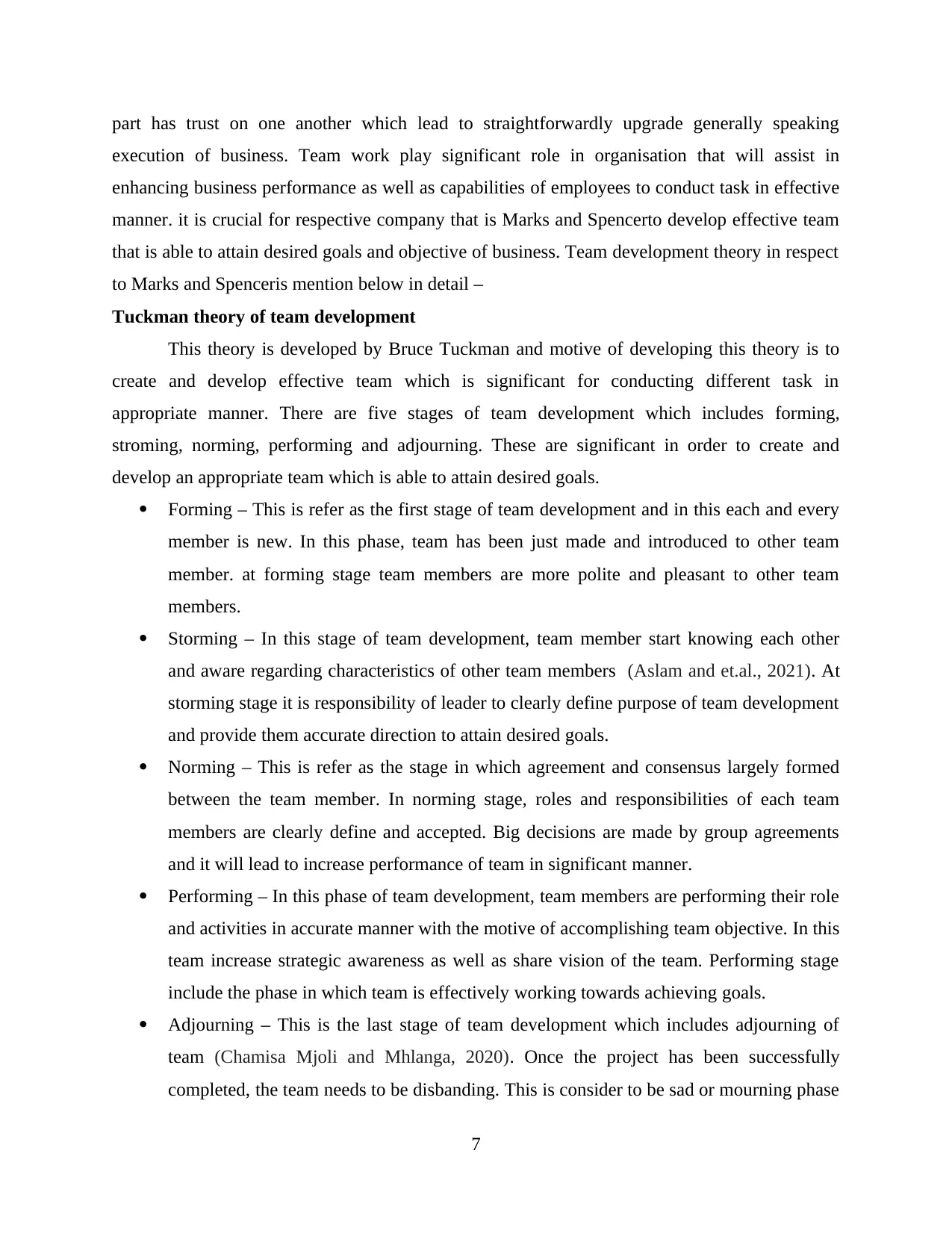
part has trust on one another which lead to straightforwardly upgrade generally speaking
execution of business. Team work play significant role in organisation that will assist in
enhancing business performance as well as capabilities of employees to conduct task in effective
manner. it is crucial for respective company that is Marks and Spencerto develop effective team
that is able to attain desired goals and objective of business. Team development theory in respect
to Marks and Spenceris mention below in detail –
Tuckman theory of team development
This theory is developed by Bruce Tuckman and motive of developing this theory is to
create and develop effective team which is significant for conducting different task in
appropriate manner. There are five stages of team development which includes forming,
stroming, norming, performing and adjourning. These are significant in order to create and
develop an appropriate team which is able to attain desired goals.
Forming – This is refer as the first stage of team development and in this each and every
member is new. In this phase, team has been just made and introduced to other team
member. at forming stage team members are more polite and pleasant to other team
members.
Storming – In this stage of team development, team member start knowing each other
and aware regarding characteristics of other team members (Aslam and et.al., 2021). At
storming stage it is responsibility of leader to clearly define purpose of team development
and provide them accurate direction to attain desired goals.
Norming – This is refer as the stage in which agreement and consensus largely formed
between the team member. In norming stage, roles and responsibilities of each team
members are clearly define and accepted. Big decisions are made by group agreements
and it will lead to increase performance of team in significant manner.
Performing – In this phase of team development, team members are performing their role
and activities in accurate manner with the motive of accomplishing team objective. In this
team increase strategic awareness as well as share vision of the team. Performing stage
include the phase in which team is effectively working towards achieving goals.
Adjourning – This is the last stage of team development which includes adjourning of
team (Chamisa Mjoli and Mhlanga, 2020). Once the project has been successfully
completed, the team needs to be disbanding. This is consider to be sad or mourning phase
7
execution of business. Team work play significant role in organisation that will assist in
enhancing business performance as well as capabilities of employees to conduct task in effective
manner. it is crucial for respective company that is Marks and Spencerto develop effective team
that is able to attain desired goals and objective of business. Team development theory in respect
to Marks and Spenceris mention below in detail –
Tuckman theory of team development
This theory is developed by Bruce Tuckman and motive of developing this theory is to
create and develop effective team which is significant for conducting different task in
appropriate manner. There are five stages of team development which includes forming,
stroming, norming, performing and adjourning. These are significant in order to create and
develop an appropriate team which is able to attain desired goals.
Forming – This is refer as the first stage of team development and in this each and every
member is new. In this phase, team has been just made and introduced to other team
member. at forming stage team members are more polite and pleasant to other team
members.
Storming – In this stage of team development, team member start knowing each other
and aware regarding characteristics of other team members (Aslam and et.al., 2021). At
storming stage it is responsibility of leader to clearly define purpose of team development
and provide them accurate direction to attain desired goals.
Norming – This is refer as the stage in which agreement and consensus largely formed
between the team member. In norming stage, roles and responsibilities of each team
members are clearly define and accepted. Big decisions are made by group agreements
and it will lead to increase performance of team in significant manner.
Performing – In this phase of team development, team members are performing their role
and activities in accurate manner with the motive of accomplishing team objective. In this
team increase strategic awareness as well as share vision of the team. Performing stage
include the phase in which team is effectively working towards achieving goals.
Adjourning – This is the last stage of team development which includes adjourning of
team (Chamisa Mjoli and Mhlanga, 2020). Once the project has been successfully
completed, the team needs to be disbanding. This is consider to be sad or mourning phase
7
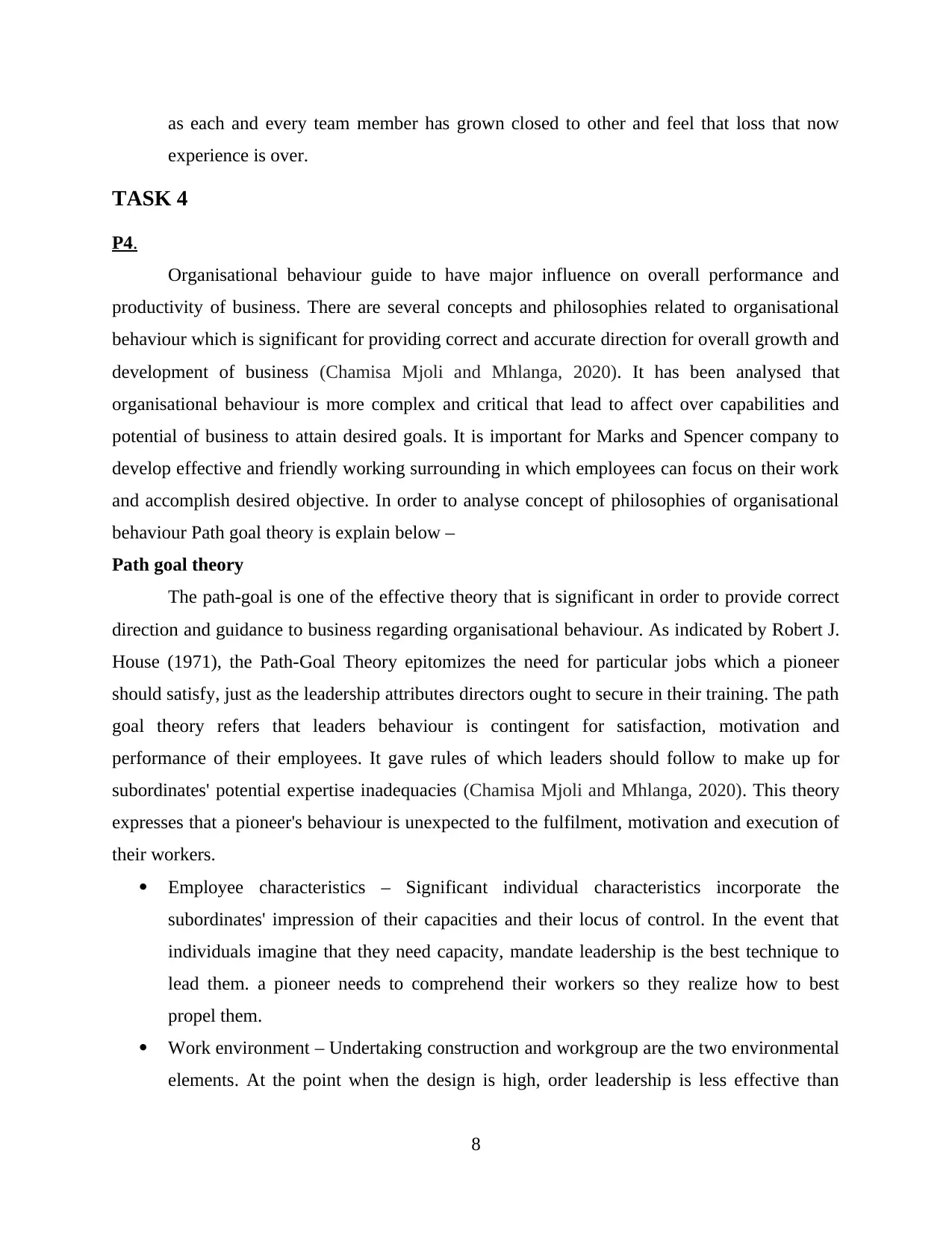
as each and every team member has grown closed to other and feel that loss that now
experience is over.
TASK 4
P4.
Organisational behaviour guide to have major influence on overall performance and
productivity of business. There are several concepts and philosophies related to organisational
behaviour which is significant for providing correct and accurate direction for overall growth and
development of business (Chamisa Mjoli and Mhlanga, 2020). It has been analysed that
organisational behaviour is more complex and critical that lead to affect over capabilities and
potential of business to attain desired goals. It is important for Marks and Spencer company to
develop effective and friendly working surrounding in which employees can focus on their work
and accomplish desired objective. In order to analyse concept of philosophies of organisational
behaviour Path goal theory is explain below –
Path goal theory
The path-goal is one of the effective theory that is significant in order to provide correct
direction and guidance to business regarding organisational behaviour. As indicated by Robert J.
House (1971), the Path-Goal Theory epitomizes the need for particular jobs which a pioneer
should satisfy, just as the leadership attributes directors ought to secure in their training. The path
goal theory refers that leaders behaviour is contingent for satisfaction, motivation and
performance of their employees. It gave rules of which leaders should follow to make up for
subordinates' potential expertise inadequacies (Chamisa Mjoli and Mhlanga, 2020). This theory
expresses that a pioneer's behaviour is unexpected to the fulfilment, motivation and execution of
their workers.
Employee characteristics – Significant individual characteristics incorporate the
subordinates' impression of their capacities and their locus of control. In the event that
individuals imagine that they need capacity, mandate leadership is the best technique to
lead them. a pioneer needs to comprehend their workers so they realize how to best
propel them.
Work environment – Undertaking construction and workgroup are the two environmental
elements. At the point when the design is high, order leadership is less effective than
8
experience is over.
TASK 4
P4.
Organisational behaviour guide to have major influence on overall performance and
productivity of business. There are several concepts and philosophies related to organisational
behaviour which is significant for providing correct and accurate direction for overall growth and
development of business (Chamisa Mjoli and Mhlanga, 2020). It has been analysed that
organisational behaviour is more complex and critical that lead to affect over capabilities and
potential of business to attain desired goals. It is important for Marks and Spencer company to
develop effective and friendly working surrounding in which employees can focus on their work
and accomplish desired objective. In order to analyse concept of philosophies of organisational
behaviour Path goal theory is explain below –
Path goal theory
The path-goal is one of the effective theory that is significant in order to provide correct
direction and guidance to business regarding organisational behaviour. As indicated by Robert J.
House (1971), the Path-Goal Theory epitomizes the need for particular jobs which a pioneer
should satisfy, just as the leadership attributes directors ought to secure in their training. The path
goal theory refers that leaders behaviour is contingent for satisfaction, motivation and
performance of their employees. It gave rules of which leaders should follow to make up for
subordinates' potential expertise inadequacies (Chamisa Mjoli and Mhlanga, 2020). This theory
expresses that a pioneer's behaviour is unexpected to the fulfilment, motivation and execution of
their workers.
Employee characteristics – Significant individual characteristics incorporate the
subordinates' impression of their capacities and their locus of control. In the event that
individuals imagine that they need capacity, mandate leadership is the best technique to
lead them. a pioneer needs to comprehend their workers so they realize how to best
propel them.
Work environment – Undertaking construction and workgroup are the two environmental
elements. At the point when the design is high, order leadership is less effective than
8
Secure Best Marks with AI Grader
Need help grading? Try our AI Grader for instant feedback on your assignments.
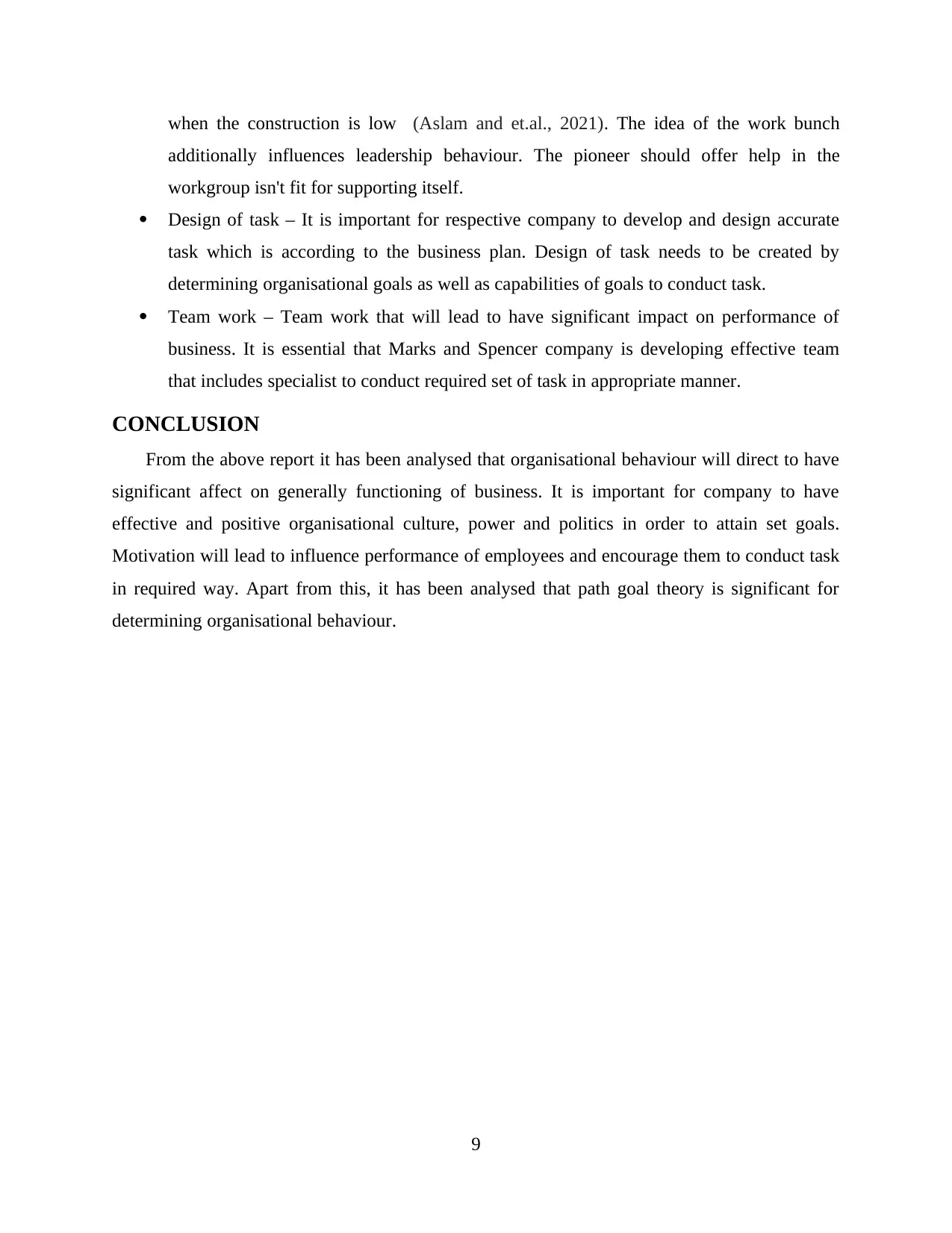
when the construction is low (Aslam and et.al., 2021). The idea of the work bunch
additionally influences leadership behaviour. The pioneer should offer help in the
workgroup isn't fit for supporting itself.
Design of task – It is important for respective company to develop and design accurate
task which is according to the business plan. Design of task needs to be created by
determining organisational goals as well as capabilities of goals to conduct task.
Team work – Team work that will lead to have significant impact on performance of
business. It is essential that Marks and Spencer company is developing effective team
that includes specialist to conduct required set of task in appropriate manner.
CONCLUSION
From the above report it has been analysed that organisational behaviour will direct to have
significant affect on generally functioning of business. It is important for company to have
effective and positive organisational culture, power and politics in order to attain set goals.
Motivation will lead to influence performance of employees and encourage them to conduct task
in required way. Apart from this, it has been analysed that path goal theory is significant for
determining organisational behaviour.
9
additionally influences leadership behaviour. The pioneer should offer help in the
workgroup isn't fit for supporting itself.
Design of task – It is important for respective company to develop and design accurate
task which is according to the business plan. Design of task needs to be created by
determining organisational goals as well as capabilities of goals to conduct task.
Team work – Team work that will lead to have significant impact on performance of
business. It is essential that Marks and Spencer company is developing effective team
that includes specialist to conduct required set of task in appropriate manner.
CONCLUSION
From the above report it has been analysed that organisational behaviour will direct to have
significant affect on generally functioning of business. It is important for company to have
effective and positive organisational culture, power and politics in order to attain set goals.
Motivation will lead to influence performance of employees and encourage them to conduct task
in required way. Apart from this, it has been analysed that path goal theory is significant for
determining organisational behaviour.
9
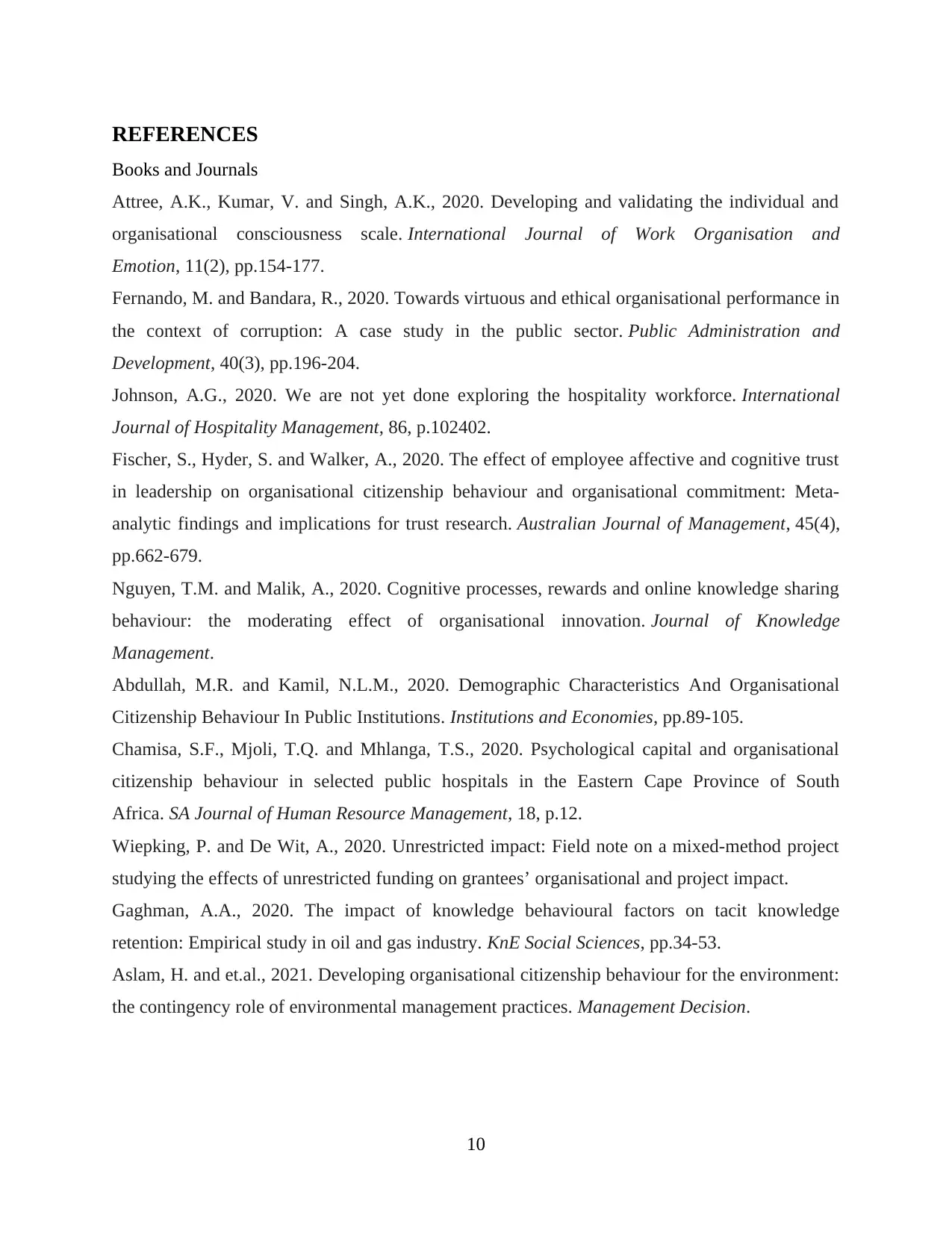
REFERENCES
Books and Journals
Attree, A.K., Kumar, V. and Singh, A.K., 2020. Developing and validating the individual and
organisational consciousness scale. International Journal of Work Organisation and
Emotion, 11(2), pp.154-177.
Fernando, M. and Bandara, R., 2020. Towards virtuous and ethical organisational performance in
the context of corruption: A case study in the public sector. Public Administration and
Development, 40(3), pp.196-204.
Johnson, A.G., 2020. We are not yet done exploring the hospitality workforce. International
Journal of Hospitality Management, 86, p.102402.
Fischer, S., Hyder, S. and Walker, A., 2020. The effect of employee affective and cognitive trust
in leadership on organisational citizenship behaviour and organisational commitment: Meta-
analytic findings and implications for trust research. Australian Journal of Management, 45(4),
pp.662-679.
Nguyen, T.M. and Malik, A., 2020. Cognitive processes, rewards and online knowledge sharing
behaviour: the moderating effect of organisational innovation. Journal of Knowledge
Management.
Abdullah, M.R. and Kamil, N.L.M., 2020. Demographic Characteristics And Organisational
Citizenship Behaviour In Public Institutions. Institutions and Economies, pp.89-105.
Chamisa, S.F., Mjoli, T.Q. and Mhlanga, T.S., 2020. Psychological capital and organisational
citizenship behaviour in selected public hospitals in the Eastern Cape Province of South
Africa. SA Journal of Human Resource Management, 18, p.12.
Wiepking, P. and De Wit, A., 2020. Unrestricted impact: Field note on a mixed-method project
studying the effects of unrestricted funding on grantees’ organisational and project impact.
Gaghman, A.A., 2020. The impact of knowledge behavioural factors on tacit knowledge
retention: Empirical study in oil and gas industry. KnE Social Sciences, pp.34-53.
Aslam, H. and et.al., 2021. Developing organisational citizenship behaviour for the environment:
the contingency role of environmental management practices. Management Decision.
10
Books and Journals
Attree, A.K., Kumar, V. and Singh, A.K., 2020. Developing and validating the individual and
organisational consciousness scale. International Journal of Work Organisation and
Emotion, 11(2), pp.154-177.
Fernando, M. and Bandara, R., 2020. Towards virtuous and ethical organisational performance in
the context of corruption: A case study in the public sector. Public Administration and
Development, 40(3), pp.196-204.
Johnson, A.G., 2020. We are not yet done exploring the hospitality workforce. International
Journal of Hospitality Management, 86, p.102402.
Fischer, S., Hyder, S. and Walker, A., 2020. The effect of employee affective and cognitive trust
in leadership on organisational citizenship behaviour and organisational commitment: Meta-
analytic findings and implications for trust research. Australian Journal of Management, 45(4),
pp.662-679.
Nguyen, T.M. and Malik, A., 2020. Cognitive processes, rewards and online knowledge sharing
behaviour: the moderating effect of organisational innovation. Journal of Knowledge
Management.
Abdullah, M.R. and Kamil, N.L.M., 2020. Demographic Characteristics And Organisational
Citizenship Behaviour In Public Institutions. Institutions and Economies, pp.89-105.
Chamisa, S.F., Mjoli, T.Q. and Mhlanga, T.S., 2020. Psychological capital and organisational
citizenship behaviour in selected public hospitals in the Eastern Cape Province of South
Africa. SA Journal of Human Resource Management, 18, p.12.
Wiepking, P. and De Wit, A., 2020. Unrestricted impact: Field note on a mixed-method project
studying the effects of unrestricted funding on grantees’ organisational and project impact.
Gaghman, A.A., 2020. The impact of knowledge behavioural factors on tacit knowledge
retention: Empirical study in oil and gas industry. KnE Social Sciences, pp.34-53.
Aslam, H. and et.al., 2021. Developing organisational citizenship behaviour for the environment:
the contingency role of environmental management practices. Management Decision.
10
1 out of 12
Related Documents
Your All-in-One AI-Powered Toolkit for Academic Success.
+13062052269
info@desklib.com
Available 24*7 on WhatsApp / Email
![[object Object]](/_next/static/media/star-bottom.7253800d.svg)
Unlock your academic potential
© 2024 | Zucol Services PVT LTD | All rights reserved.





